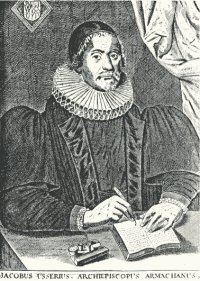
By Hamish Johnston
About 13.7 billion years is the best estimate for the age of the universe, but how did scientists reach this conclusion and what twists and turns were encountered along the way?
That was the question that the BBC’s Melvyn Bragg put to three astronomers this morning on his radio programme In Our Time. Bragg’s guests were Martin Rees – Britain’s Astronomer Royal – Carolin Crawford of the University of Cambridge and Carlos Frenk of the University of Durham.
Bragg begins with James Ussher’s pronouncement of 1654 that the Earth was formed at 6 p.m. on 22 October 4004 BC. Ussher (right) was Archbishop of Armagh and this date was the result of painstaking historical and biblical research.
This Old Testament view of creation endured until the 19th century, when geological evidence and the new theory of evolution suggested that the Earth was at least hundreds of millions of years old – a figure championed by none other than Charles Darwin.
At first, however, evidence from the heavens seemed to contradict earthbound data. Indeed Lord Kelvin calculated that the Sun was at most a few million years old. His argument – which assumed that our star is heated by gravitational energy – was so persuasive that it made Darwin doubt his geological and evolutionary observations.
The discovery of radioactive fission muddied the waters even more. On one hand it suggested that the Earth was as much as three billion years old, but it could not ascribe a similar longevity to the Sun. Eventually, estimates for the ages of the Earth, Sun and the universe fell into line thanks to the work of astronomers, astrophysicists and cosmologists.
To hear more details of the various theories about the age of the universe – including Newton’s rather elegant proof that the cosmos is at equilibrium and therefore ageless – listen to Bragg’s programme here.



